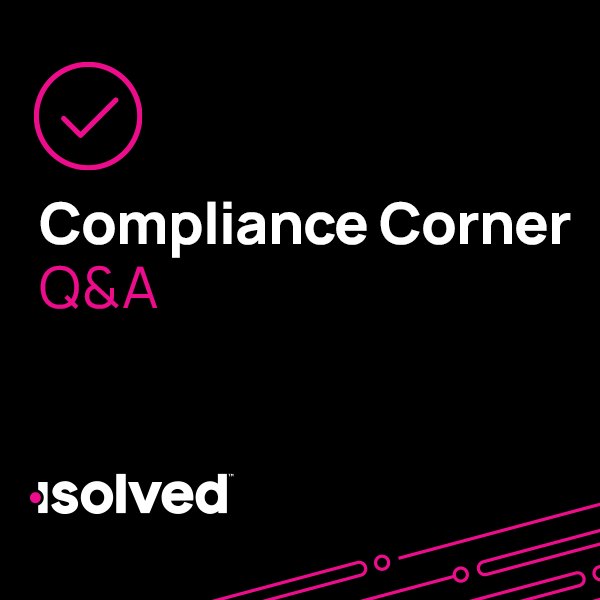November Compliance Corner: Employee Experience - the Key to a Thriving Workforce
Tuesday November 21st, 2023
Estimated time to read: 2 minutes

The employee experience begins from the moment a job seeker reads a job posting through the time they leave the company and every aspect of the life cycle in between. Taking a holistic approach to the employee experience leads to higher employee engagement, job satisfaction and retention. Here, Lisa Bright, isolved's HR Services HR Business Partner provides answers to some commonly asked questions.
What steps can a company take to boost the employee experience?
1) Increase workplace autonomy by ditching micromanaging. This will provide employees with a sense of job satisfaction, higher productivity and well-being. Promote work life balance by offering flexibility in work schedules and timelines.
2) Invest in employee development by providing employees with access to training programs and continuing education programs that align with organizational learning and growth opportunities.
3) Ensure the organizational culture contributes to the success of both the organization and employees. Explore ways the organization can impact society and the environment. Create a collaborative culture by allowing employees to share ideas.
4) Prioritize and invest in digital transformation. Enhancing the digital employee experience allows employees to be more productive, provides two-way communication and improves business profitability.
How can a company measure employee experience success?
Here is how organizations can measure their efforts:
- Set employee retention key performance indicators focusing on turnover, conducting stay interviews and exit interview to gather information on why employees are choosing to leave.
- Measuring productivity through actual output and achievement assists in determining if the employee experience is positive or negative. Higher productivity indicates employee job satisfaction.
- Track employee absenteeism. High numbers of sick days taken could be an indication of high stress or poor workplace culture.
- Develop internal promotion goals to grow talent in existing employees.
- Measure job satisfaction by using online surveys, focus groups or interviews and provide employees with a tool to provide improvement suggestions and ideas.
- Conduct a wellness check survey using self-reported data.
What are the benefits of investing in a positive employee experience?
A favorable employee experience impacts the organization in many ways, including:
- Increases employee engagement leading to higher motivation and output
- Attracts quality candidates and provides competitive advantage
- Reduces overall cost of employee turnover and increases retention
- Translates into positive customer satisfaction
- Fosters workplace collaboration and inspires creativity
- Creates a positive impact on the company brand image
Looking forward to 2024, what trends will dominate?
The benefits of having a positive employee experience are beneficial today and will be in the future. Here’s what we can expect:
- Future workers will want to engage in meaningful work where they feel appreciated and have work life balance.
- Integration of artificial intelligence will automate repetitive or tedious tasks to streamline engagement.
- Personalized and holistic wellness programs offering access to resources for mental, physical and emotional health will rise in popularity.
- Companies that can champion ethical conduct, sustainability and salary transparency will be successful in attracting job seekers and retaining top talent.
The key to business success is a thriving workforce achieved by developing a positive employee experience.
Need help with essential HR tasks so you can focus on elevating your organization's employee experience? Discover how isolved HR Services can help.
About Lisa Bright:

Lisa serves on the isolved Defined HR Services team, bringing more than 20 years of experience in HR. She has supported a variety of industries including healthcare, manufacturing, education and preferred employer organizations. Her areas of expertise include compensation and benefits, policy compliance, employee relations and performance management.
